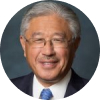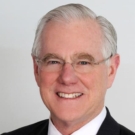NAM Officers and Council
The National Academy of Medicine’s NAM Perspectives health periodical provides a venue for leading health, medical, science, and policy experts to reflect on issues and opportunities important to the advancement of our mission.
Leadership

Victor J. Dzau, MD, is the President of the National Academy of Medicine (NAM), formerly the Institute of Medicine (IOM). In addition, he serves as Vice Chair of the National Research Council. Dr. Dzau is Chancellor Emeritus and James B. Duke Distinguished Professor of Medicine at Duke University and the past President and CEO of the Duke University Health System. Previously, Dr. Dzau was the Hersey Professor of Theory and Practice of Medicine and Chairman of Medicine at Harvard Medical School’s Brigham and Women’s Hospital, as well as Bloomfield Professor and Chairman of the Department of Medicine at Stanford University.
Dr. Dzau is an internationally acclaimed physician scientist and leader whose work has improved health and medicine in the United States and globally. His seminal work in cardiovascular medicine and genetics laid the foundation for the development of the class of lifesaving drugs known as ACE inhibitors, used globally to treat hypertension and heart failure. Dr. Dzau pioneered gene therapy for vascular disease and was the first to introduce DNA decoy molecules in humans in vivo. His pioneering research in cardiac regeneration led to the Paracrine Hypothesis of stem cell action and his recent strategy of direct cardiac reprogramming using microRNA. He maintains an active NIH-funded research laboratory.
Dr. Dzau is a leader in health and heath policy. At the NAM, he has led important initiatives such as Vital Directions for Health and Health Care, the Action Collaborative on Countering the US Opioid Epidemic, and the Action Collaborative on Clinician Well-Being and Resilience. Under his tenure, the NAM has advanced efforts to improve health equity and address racism throughout its programmatic activities, especially the Culture of Health Program. Most recently, the NAM launched a Grand Challenge in Climate Change and Human Health & Equity to reverse the negative effects of climate change on health and social equity by activating the entire biomedical community, communicating and educating the public about climate change and health, driving changes through research, innovation and policy, and leading bold action to decarbonize the health care sector.
As a global health leader, he helped design and launch the National Academies initiatives on Global Health Risk Framework; Global Health and Future Role of the US; Crossing the Global Quality Chasm and Human Genome Editing. The NAM Global Grand Challenge for Healthy Longevity represents his vision to inspire across disciplines and sectors to coalesce around a shared priority and audacious goal to advance health.
He has led the NAM’s response to COVID-19, which includes numerous committees, reports, consultations and communication on a range of issues including public health, vaccine allocation, health equity and mental health. He has worked tirelessly to engage with the global response to COVD-19 by providing leadership as a member of the Global Preparedness Monitoring Board, co-chair of the G20 Scientific Expert Panel on Global Health Security, Advisor to the G20 High Level Independent Panel on Financing and a principal of the ACT-Accelerator which includes COVAX, the global collaboration for accelerating the development, manufacture and equitable distribution of COVID-19 vaccines.
He is active in advising science and health in US and globally. He has served as a member of the Advisory Committee to the Director of the National Institutes of Health (NIH), chaired the NIH Cardiovascular Disease Advisory Committee and NHLBI Cardiovascular Progenitor Cell Biology Consortium. Currently, he chairs the Cardiovascular Progenitor Cell Translational Consortium. He is a member of the Health and Biomedical Sciences International Advisory Council of Singapore, as well as a board member of the Imperial College Health Partners, UK and the Gairdner Foundation. He chairs the International Scientific Advisory Committee of the Qatar Precision Medicine Institute, the Scientific Boards of the Peter Munk Cardiac Center, University of Toronto and Institute of Cardiovascular and Medical Sciences, University of Glasgow. He served on the Board of Health Governors of the World Economic Forum and chairs its Global Futures Council on Healthy Longevity.
Among his many honors and recognitions are the Max Delbreck Medal from Charite, Humboldt and Max Planck, Germany, the Distinguished Scientist Award from the American Heart Association, Ellis Island Medal of Honor, and the Henry Freisen International Prize. In 2019, he was named an Honorary Citizen of Singapore- the highest level of honor bestowed to a foreign citizen conferred by the President of Singapore. He has been elected to the National Academy of Medicine, the American Academy of Arts and Sciences, the European Academy of Sciences and Arts, UK Academy of Medical Sciences, the Japan Academy, Mexican Academy of Medicine, Chinese Academy of Engineering and Academia Sinica. He has received 16 honorary doctorates.

Michael McGinnis, a physician and epidemiologist, is an elected member of the National Academy of Medicine (1999), now serving as NAM Senior Scholar, Leonard D. Schaeffer Executive Officer of the NAM and Executive Director of the NAM Leadership Consortium. He is the architect of the NAM’s Learning Health System Initiative catalyzing collaborative national progress in the alignment of science, informatics, incentives, and culture for continuous improvement in health and health care. Our Shared Commitments represents the promise and expectations of this work. To provide platforms for societal uptake of this and other NAM contributions, Dr. McGinnis also established Action Collaboratives for cooperative projects of multiple stakeholders, and the periodic publication vehicle, NAM Perspectives.
A longstanding field leader, Dr. McGinnis has helped shape the field of population health in various ways. The Fries Prize for Improving Health cited him for “fundamentally transforming our nation’s understanding about how to improve health by re-conceptualizing the nation’s perspective on its leading health threats and establishing the Healthy People process of national goals and objectives to target action.” His article with William Foege, Actual Causes of Death (JAMA, 1993) integrated epidemiologic studies to demonstrate, qualitatively and quantitatively, that most of the leading killers of Americans—e.g. heart disease, cancer, stroke, diabetes—had preventable root sources, many of which were behavioral, environmental, and social in nature. Building on this work, he and colleagues later showed, again quantitatively and qualitatively, that the health of individuals and populations is the result of the interplay of dynamics in five domains: genetic predispositions, behavioral choices, social circumstances, physical environments, and medical care (The Case for More Active Policy Attention to Health Promotion, Health Affairs 2002).
Dr. McGinnis’ has accelerated the impact of health and medical science through the development of practical tools and strategies for front line application of the evidence. As Assistant Surgeon General and Deputy Assistant Secretary for Health at the Department of Health & Human Services in four Presidential Administrations (1977 to 1995, a tenure unusual for political and policy posts), he held leadership responsibilities for federal activities in disease prevention and health promotion. In this period, he conceived and launched several still ongoing national programs: the Healthy People national goals and objectives (above), the Dietary Guidelines for Americans (with USDA), and the U.S. Preventive Services Task Force. Later, as Senior Vice President and head of the Health Group at the Robert Wood Johnson Foundation (1999-2005), Dr. McGinnis led development of the platform for the Foundation’s shift to sustained leadership and funding in population health science and the social determinants of health.
With a global health interest from the outset of his career, Dr. McGinnis coordinated U.S.-Eastern European health exchange programs and later served as state director in India for the WHO smallpox eradication program (1974-5), developing the surveillance system for the country-wide post-eradication operations. In post-war Bosnia as Chair of the World Bank/European Commission Task Force on Health & Human Services (1995-6), he led development of the signed agreement on priorities and strategies for rebuilding the health and human services capacity—the first such agreement outside the Dayton Accords.
Dr. McGinnis’ publications include more than 200 articles and book chapters, and 20 edited books. Various national recognitions include the public health Distinguished Service Award (1994), Health Leader of the Year Award (1997), Public Health Hero Award (2013), and the Fries Prize for Health Improvement (2018). His degrees are from Berkeley (1966), UCLA (1971), and Harvard (1977).
Governing Council





Karen DeSalvo, MD, MPH, is a dedicated global health leader who has committed her career to improving health outcomes by using technology, medicine, and public health. Her work focuses on addressing the social determinants of health. In her recent capacity as Google’s Chief Health Officer, Dr. DeSalvo spearheaded the team of health professionals dedicated to harnessing Google’s tools and technology to help everyone, everywhere, live a longer, healthier life. She was instrumental in integrating health-focused applications into Google’s diverse product ecosystem and provided medical leadership for employee health and safety initiatives. Before Google, Dr. DeSalvo held significant roles in the U.S. government, including National Coordinator for Health Information Technology and acting Assistant Secretary for Health. She was also the Health Commissioner in New Orleans following Hurricane Katrina, where she helped lead public health recovery efforts. She served as a Professor and Vice Dean for Community Affairs and Health Policy at Tulane School of Medicine. Dr. DeSalvo currently sits on the Boards of Directors for Welltower and CityBlock Health and is a member of the Council of the National Academy of Medicine. She is a member of the WHO Commission on Social Connection. She co-founded the National Alliance for the Social Determinants of Health (NASDOH). Her past roles include serving on the Medicare Payment Advisory Commission and the Humana Board of Directors, as well as being President of the Society of General Internal Medicine. She holds an MD and MPH from Tulane University and a master’s in clinical epidemiology from Harvard School of Public Health. Her contributions have been recognized by Modern Healthcare, which has repeatedly named her among the “100 most influential people in health,” and by Time Magazine, which included her as a “Titan” on their “Time 100 in Healthcare” list.












